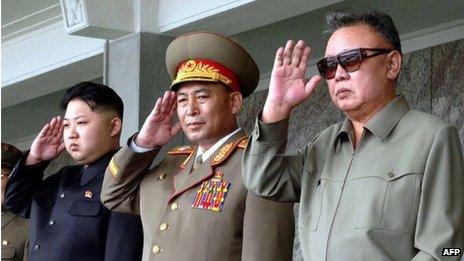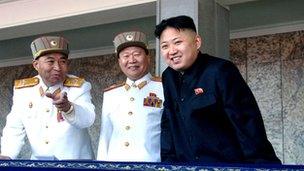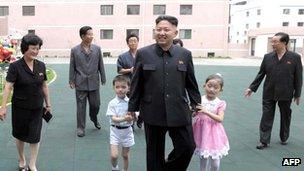North Korea’s top soldier: A diplomatic illness?
- Published

Mr Ri (C), with the late North Korean leader Kim Jong-il (R) and his son Kim Jong-un
North Korea has suddenly announced that Ri Yong-ho - chief of the general staff of the Korean People's Army (KPA) and for the past three years the politically most powerful of Pyongyang's top brass - has been relieved of all his posts "for his illness".
Ri is only 69, younger than most of North Korea's gerontocracy. In May he led a delegation to Laos, and was out and about in June, so his illness seems sudden.
In Pyongyang, illness is often used as a pretext, as are car accidents. Or an elite figure simply vanishes unannounced.
It would be hard to do that for Mr Ri, who has had a high profile since February 2009 when he was named as military chief.
A near-complete unknown at that point, he turned out to be close to Kim Jong-il and a former defence commander of Pyongyang, the capital.
He is also an artillery expert. Many in Seoul see his hand behind the shelling of Yeonpyeong Island in November 2010, itself a bid to boost the then newly unveiled young successor Kim Jong-un.
Fallen star
Mr Ri had a key role in the succession process. Promoted to vice-marshal, he shared a new post, vice-chair of the ruling Workers' Party of Korea's (WPK) Central Military Commission, with the young Kim.
Photos showed him seated between the two Kims, father and son, while top KPA figures hitherto better known were demoted. Mr Ri's star was on the rise.
Now it has plunged. The likeliest reason is a fallout with another rising star, Choe Ryong-hae. Also long close to the Kim family, Mr Choe in April was suddenly made a vice-marshal - despite having no military background - and put in charge of the KPA's political bureau.
Vesting that key post in a uniformed civilian is unprecedented. Real life-long soldiers surely seethe at having an amateur pull rank on them. Moreover, in the party hierarchy, Mr Choe leapt over Mr Ri, outranking him in the WPK's five-man presidium.
Ups and downs
Now it is Mr Choe who hogs the limelight. When Kim Jong-un wanted a funfair rebuilt - his priorities are revealing - it was Mr Choe he called, not Mr Ri.

There are reports that Choe Ryong-hae (C) is now one of North Korea's rising stars
How do we interpret such ups and downs more broadly? In three ways. First, there is a sheer struggle for power, and in particular to be close to and mentor the untried Kim Jong-un.
So Mr Choe is up, Mr Ri is down. The other key figures to watch are the late Kim Jong-il's sister Kim Kyong-hui and her husband, Jang Song-thaek - Pyongyang's ultimate power couple.
Second, there are institutional rivalries, especially between the party and army. Under Kim Jong-il, the KPA ruled the roost, but now the WPK seems to be clawing back power, as seen in Choe Ryong-hae's new post. The army is crucial, but may need reining in.
Third comes policy. What do you do with power once you have it? In his first public speech - itself an innovation - Kim Jong-un pledged that people would no longer have to tighten their belts. That is a tall order, when millions go hungry and a severe drought in May and June will badly hit this year's harvest.
Prosperity requires reform, and even then will be a long haul. Kim Jong-il was dead against the market, and his son has yet to give any clear signals. Beijing is urging him to reform.
We could posit outside powers, especially China, as potentially a fourth influence on the post-Kim Jong-il swirl in Pyongyang over power and policy. Kim Jong-nam, Kim Jong-il's disinherited and outspoken first-born son, still lives in China: waiting in the wings?

Kim Jong-un has been leader of North Korea for only seven months
Secret politics
Real politics in Pyongyang goes on in secret - in smoke-filled rooms far from the impressive but misleading theatrical public displays of mass unity. Hitherto, the elite have succeeded in conducting their struggles over power and policy largely unseen, with the results smoothly presented, as now with the ousting of Mr Ri.
Can that go on? North Korea faces tough choices over economic policy and the nuclear issue. (On the latter, as in Iran, the fear is that even would-be modernisers are not about to give up the bomb.) It may prove hard to keep the debates private, if they grow fierce.
For that matter, we cannot rule out that North Korea's long-suffering people might find a voice. A Ceausescu moment, when a lone heckler gets everyone shouting back and then all hell breaks loose, must be the regime's nightmare. But so far they have kept the lid well on.
Kim Jong-un has been at the helm - if indeed he is - for only seven months. Thus far, North Korea under him has shown far more continuity than change. Yet more of the same dreary, old hollow rituals will not solve North Korea's problems. Nor will sprucing up funfairs.
If we see more "illnesses" like Ri Yong-ho's, it will be a sign that Pyongyang's mask and myth of unity are starting to crack. Behind the scenes, things are already stirring. Soon they may be seething.
<italic>Aidan Foster-Carter is </italic> <italic>Honorary </italic> <italic>Senior </italic> <italic>Research </italic> <italic>Fellow in </italic> <italic>S</italic> <italic>ociology </italic> <italic>and</italic> <italic> M</italic> <italic>odern Korea, Leeds University</italic> <italic>.</italic>